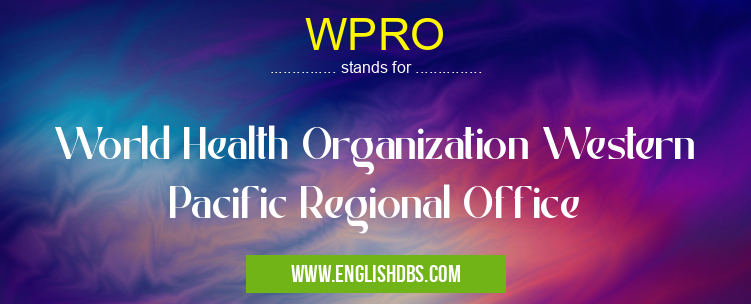What does WPRO mean in UNITED NATIONS
The World Health Organization (WHO) Western Pacific Regional Office (WPRO) is a key part of WHO that works in the Asia-Pacific region dedicated to improving the health and wellbeing of people in this region. WPRO's mission is to facilitate greater collaboration between the public, private, and civil sectors in order to deliver better health services for those who live in this area.

WPRO meaning in United Nations in Governmental
WPRO mostly used in an acronym United Nations in Category Governmental that means World Health Organization Western Pacific Regional Office
Shorthand: WPRO,
Full Form: World Health Organization Western Pacific Regional Office
For more information of "World Health Organization Western Pacific Regional Office", see the section below.
Role
The WPRO serves as a hub for collaboration between scientists, policy makers and healthcare practitioners who are working together towards a common goal - improved health outcomes for the people who inhabit this region. Through joint partnerships and initiatives, WPRO works with other stakeholders to design programs, coordinate research activities, and provide guidance on topics related to public health such as nutrition, disease prevention, immunization, environmental health and more.
Impact
By facilitating greater cooperation between different nations and organizations in the region, WPRO helps create on-the-ground strategies that can have real impacts on the lives of individuals within this diverse area. By providing guidance on topics related to public health and creating programs that allow for cross-border sharing of resources, knowledge and expertise, WPRO is helping improve access to quality healthcare services across Asia Pacific. Their work is also encouraging governments in the region to make commitments towards reducing preventable deaths from diseases such as malaria or tuberculosis.
Essential Questions and Answers on World Health Organization Western Pacific Regional Office in "GOVERNMENTAL»UN"
What is the WHO Western Pacific Regional Office?
The WHO Western Pacific Regional Office (WPRO) is part of the World Health Organization, which is a specialized agency of the United Nations. It serves as the regional office for 38 countries and areas in the Western Pacific region. WPRO works to improve health and reduce inequalities amongst this population through evidence-based strategies, collaboration, and capacity building.
What are some of the activities carried out by WPRO?
WPRO focuses on providing technical support and guidance to member states to ensure they are better able to prevent, detect, investigate, manage and contain public health threats. This includes promoting healthy lifestyles, developing effective health care systems, responding quickly to emergencies or outbreaks, strengthening research capabilities, and supporting global health initiatives.
What countries does WPRO cover?
WPRO covers 38 countries and areas in the Western Pacific region including Australia, China, Japan, Vanuatu, Fiji Islands, Laos PDR., New Caledonia and more.
How does WPRO work with governments in its region?
WPRO works closely with governments in its region by providing advice and support on how best to implement national policies related to public health and other relevant issues. It can also provide assistance in negotiating agreements between states when necessary. Additionally it assists with monitoring compliance with international laws or standards related to health care provision.
How can I access information from WPRO?
You can access information from WPRO from its website which contains reports on current projects as well as news updates from the organization covering developments in global health policy within its region.
Are there any opportunities for individuals interested in working for WHO or WPRO?
Yes! WHO/WPRO frequently have job openings ranging from entry-level positions such as interns or assistants up to high level posts such as territory managers or country representatives. Job seekers should check out their website for detailed information about current vacancies or contact their recruitment team for further details if necessary.
What does WHO/WPRO do to address gender inequity within healthcare systems around the world?
WHO/WPRO actively works towards advancing gender equity through initiatives such as increasing access to primary care services (especially sexual & reproductive healthcare services) that target both women & men equally while catering specifically to unique needs arising due to gender differences in different cultures like traditional roles & stigma surrounding menstruation & sexual health concerns etc.. They also work towards reducing gender-based violence through policy changes & focus on awareness building campaigns across all age groups etc..
Does WHO/WPROs jurisdiction extend beyond just medical issues?
Yes indeed! Multisectoral actions that involve cross-sector collaboration with government agencies & other civil society stakeholders play an essential role when working towards achieving optimal public health outcomes; considerations include factors such as water safety; food security; education; housing conditions; poverty alleviation etc..
Is there any way I can directly contribute towards helping improve global level healthcare outcomes within the region served by WHO/WRO?
Sure! Individuals are encouraged to join local community organizations or participate in volunteer programs that target specific pressing public health issues like vaccinations campaigns ; preventive measures against vector borne diseases etc..Alternatively you could choose even become a donor or financial contributor who directly supports ongoing efforts towards improving public healthcare outcomes.
Final Words:
Through their efforts towards supporting international collaborations at a regional level, WPRO is helping build a healthier future for millions of people across Asia-Pacific. By facilitating greater dialogue among decision makers from various countries in the region, WPRO strives to reduce preventable deaths from diseases which could otherwise be treated or prevented through adequate healthcare services being accessible within each population.
